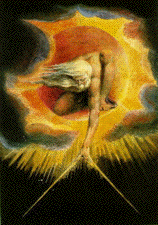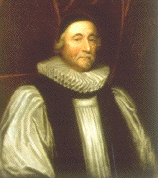October 23: The Beginning of the World
James Ussher and the Creation (4004 BCE)
It was on this date, October 23, 4004 BCE, that the Earth was created by God. It is disheartening to report that many Christians will leave it at that.
The exact dating of the age of the earth was arrived at by an Irish theologian, Archbishop of Armagh, James Ussher [or Usher] (1581-1656), in his Chronologies of the Old and New Testaments, which was first published 1650-1654. Ussher arrived at his conclusion by careful counting of the "begats" in the Bible, with perhaps some divine guidance. His contemporary, Sir John Lightfoot (1602-1675), Vice-Chancellor of Cambridge University, who arrived at the same year through independent calculation, added the detail that the world began at 9:00 AM, GMT, or midnight Garden-of-Eden time.
A dating scheme that may seem silly to the enlightened today was printed on Bibles until the late 19th century, when scientific evidence of a much older Earth made the naïve calculations of the two clerics laughable. What isn't so humorous is that in spite of advances in Earth sciences, almost 20 percent (19.1%) of Americans still believe that the world was created by God between 5000 and 10,000 years ago!
It's not surprising that the Judeo-Christian civilization reveres its creation myth. Every civilization worthy of the name creates its own and believes it just as fervently. Perhaps the only innovation was the distinction between creating (bara or בָּרָא) and making (asa or עָשָׂה) the universe: making is understood as fashioning with pre-existing materials; creating involves making something out of nothing. One obviously requires a greater leap of faith because it is beyond experience, not to mention beyond science!

"Urizen as the Creator of the Material World" from "Europe, A Prophecy" Title Page, Lambeth: Printed by William Blake, 1794
It is doubtful that whoever wrote the first Hebrew words of Genesis, רֵאשִׁית ("In the beginning" and so on), meant more than "first of all" or "to begin with," so the distinction was an invention of theologians. The childish tale of Adam and Eve was borrowed from the Babylonians. The Greeks and Romans adapted the warring gods myth for their creation stories. The ancient Egyptians had their story of the first god (Atum), as did the Assyrians (Annunaki). The Aztecs had their story called Coatlique or the "Lady of the Skirt of Snakes." The Maya had their story called Popol Vuh. The Inca had their story of Con Tiqui. The Navaho, Apache, Iroquois and other American Indians had their creation stories. So did the ancient Hindus, Persians, Chinese (Pangu or 盤古), Japanese (Izanagi and Izanami), Samoans (Tangaroa), Norsemen, Maori and others – including the Kalahari Bushmen of Africa and other tribes indigenous to the African continent.
What is important is not so much what these legends had in common with each other, or with the legend the Christian cult appropriated from the ancient Hebrews, but that each race has its legend. Each race believes it completely because they are told they must, and each one is impossible to prove true. That creationist fantasies persist in an age of general literacy, universal education, and substantial wealth and prosperity in the Western world, or at least in the United States (European countries are more skeptical), is something about which Archbishop Ussher would not have been surprised. But Ussher died over three hundred years ago, when people routinely died before seeing their fortieth birthday.
So, as we celebrate the Earth's birthday, some six-thousand years on, we can thank James Ussher, a believer in the rule of kings by divine right, whose tireless scriptural study and deep faith came up with exactly the wrong answer, and misled generations who might have been studying the age of rocks, rather than the Rock of Ages!
Originally published October 2003 by Ronald Bruce Meyer.



